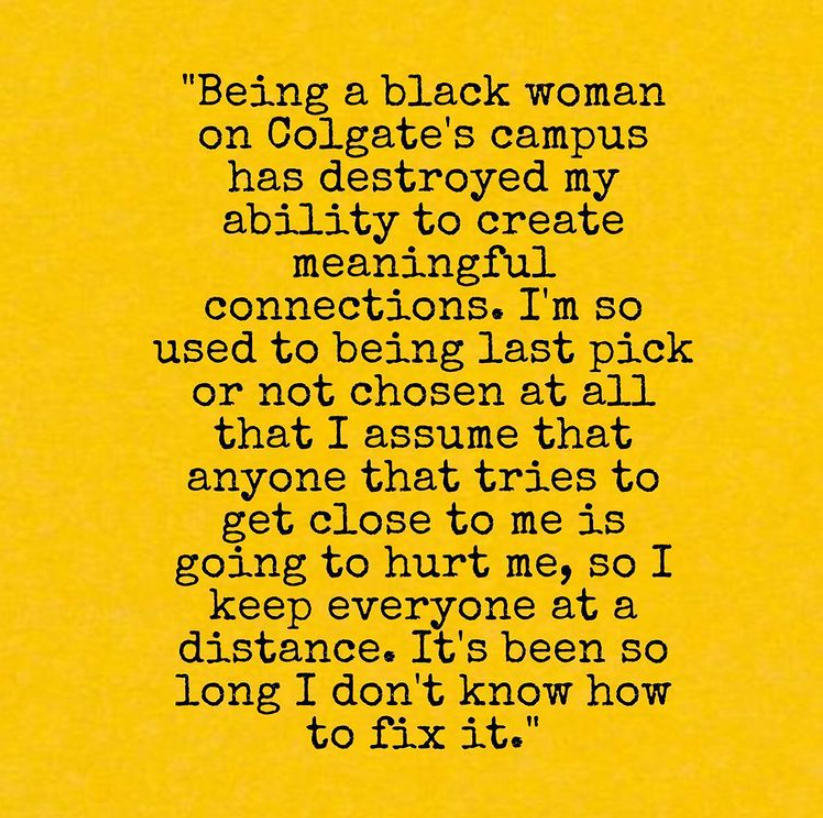Breaking the Cycle: The Untapped Potential of the Core Curriculum
My Introduction to the Cycle
My first year on campus was filled with excitement and filled with firsts. My first class, first exam, first core curriculum text, first campus job, and first friends all marked the milestones of embarking on a new frontier and integrating myself in this institution. In November came a first I was not expecting – the first racist incident I was to experience on campus.
Buildings and Grounds removed the “it’s okay to be white” posters long before I would have encountered one, and I was comforted by the Lawrence classroom packed for a panel discussion on “White Supremacists, Neo-Nazis, and Domestic Terrorists: How to Oppose the Return of Fascism.” I slept soundly that night, content that I had chosen a school that would stand proud against injustice and content with the explanation that this incident was an anomaly.
Unfortunately, that was not the last racist incident I lived through on campus, and the speak outs, protests, and lecture series have yet to slow them down. This summer a group of Maroon News editors wrote a story describing the cycle of racist incidents, and the deafening silences in between. Although racist incidents are often followed by a flurry of community care and attempts at education, the cycle persists because these responses are largely reactive and are catered to students on campus who are already somewhat passionate about social justice. The conversation focuses on the incident and fails to address underlying structural violence.
What do we owe to marginalized students?

Amid #BlackLivesMatter protests this summer, a few Instagram accounts popped up expressing their disgust with injustice on Colgate’s campus. The accounts mainly focused on the impacts of sexual assault and racism on campus. @Blackatcolgate and @blackgirlsatcolgate are filled with anonymous reports of incidents of racism that never got a protest or a speak out. These upsetting stories suggest that racist incidents are not freak occurrences, but are rather emblematic of a culture that is perhaps more tolerant of casual racism than of black students.
Core Questions of Justice has the potential to break this cycle of racism on campus; specifically, it has the potential to disrupt the silence and inaction between incidents. While short orientation courses and Diversity, Equity, and Inclusion trainings for Greek Letter Organizations have failed to make lasting change, this Core Revision proposal would allow Colgate to do what it does best: to teach. This course would foster a critical examination of one’s place in society and provide a neutral space for difficult dialogues about morality and our obligations to one another. Core Questions of Justice is a first step to addressing a systemic failure to engender dialogue about what it means to be right or wrong.
Racist incidents at Colgate are merely the loudest example of a campus culture that is comfortable with privilege and uncomfortable with responsibility.
We Can Do Better
The current Core classes are engaging and academically challenging, but they represent the willful ignorance of the privileged. Legacies of the Ancient World and Challenges of Modernity have not only failed to support minority students on campus but have also perpetuated narratives of Western exceptionalism and ignored achievements of other cultures. Jeffrey Leyton explores the functionality of the Core curriculum and how best to achieve these goals in his post.
His discussion of the challenges faced by the Core Revision Committee gives an overview of the shortcomings of the current Core system. Legacies of the Ancient World is designed to prepare students for the traditional world of academia by providing us with a classical vocabulary and an understanding of the pillars of “Western Civilization,” while Challenges of Modernity offers an update on hallmarks of global excellence. Core courses aim to provide students with the tools to engage in dialogue about complex topics but fail to provide tools to understand social problems or construct our own moral compass.
Colgate owes its students the opportunity to strive for better. Within the ambitious 13 Goals of a Colgate Education, items 1, 5, 7, 9, 10, 11, 12, and 13 are all related to understanding the concept of justice. Item 10 specifically claims that a Colgate education enables students to “be engaged citizens and strive for a just society” without defining what a “just society” looks like. Justice is a fraught and complex concept that is intimately bound up with personal experiences.
Neither course provided me with a framework for understanding the killing of George Floyd, Breonna Taylor, or Ahmad Arbery. Neither provided me with an approach to seeking justice for victims of sexual assault on this campus. If Colgate’s goal is to shape young adults into engaged citizens who are ready to face contemporary challenges, Core 151 and 152 provide an inadequate framework.
By Elizabeth Shaw
Assistant Editor of the Bakers Dozen Section of the Maroon News